Choosing the best marine battery for your boat can be a daunting task. With the rapid advancements in battery technology, particularly around lithium options, it challenging to find the right battery that fits your setup and budget.
Whether you're looking for marine trolling motor batteries, starting batteries, or dual-purpose batteries, it is crucial to choose the right battery to ensure reliable performance. In this guide, we will explore key factors to consider, the types of marine batteries available, along with our picks for the top performing marine batteries for you.
Table of Content
What to Consider When Choosing the Best Marine Battery?
Before purchasing a marine boat battery, take the following factors into account:
- Battery Purpose
Determine whether the battery is needed for starting, deep cycling, or dual purposes. Starting or cranking batteries are designed to power the engine, while deep-cycle batteries provide a consistent supply of power to electronics and trolling motors.
- Battery Type
Decide between lead-acid, AGM, or lithium-ion batteries. Best lithium marine batteries are increasingly popular due to their lightweight design, longer lifespan, and maintenance-free operation. We’ll talk about the types of battery later.
- Battery Capacity
Measure the amp-hour (Ah) rating to determine how long a battery can provide power. For larger boats with more electronic devices, a higher capacity battery will be essential.
- Durability and Weather Resistance
Look for batteries that are resistant to extreme temperatures, vibrations, and water damage. This ensures longevity and reliability during tough marine conditions.
- Budget
If you have a flexible budget, you'll have a wider range of choices, from different brands to advanced features. Conversely, if you're working with a limited budget, there are more cost-effective options to consider.

What Type of Battery is Best for Marine Use?
Understanding the two primary types of marine batteries: lead-acid batteries and lithium-ion batteries. Both have distinct characteristics, making them suited for different marine applications.
Lead-Acid Marine Batteries
Lead-acid batteries have been a popular choice for marine use due to their affordability and reliability. They come in two main types: flooded lead-acid batteries and sealed AGM (Absorbed Glass Mat) batteries.
- Flooded Lead-Acid Batteries: These require regular maintenance, including topping up with water and ensuring proper ventilation. They are budget-friendly but can be prone to spillage and corrosion in harsh marine conditions.
- AGM Marine Batteries: Sealed and maintenance-free, AGM marine batteries are spill-proof and offer better durability than flooded versions. They can handle deep discharges, making them a better option for trolling motors and other accessories.
Lithium-Ion Batteries
Lithium-ion marine batteries, particularly LiFePO4 (Lithium Iron Phosphate), are becoming the go-to choice for boaters due to their lightweight design, longer lifespan, and superior performance.
- LiFePO4 Batteries: These offer better energy efficiency, faster charging, and a much longer life span (up to 4000+ cycles). They are also resistant to extreme temperatures, vibrations, and marine environments, making them ideal for trolling motors, electronics, and starting engines.
While lead-acid batteries have been used traditionally, lithium marine batteries have become the top choice for boaters. Lithium batteries like Redodo’s LiFePO4 models offer superior advantages, including:
- Lightweight construction (up to 50% lighter than lead-acid batteries)
- Longer lifespan (up to 4000+ cycles)
- Fast charging times
- Low self-discharge rates
- Resistance to harsh marine environments
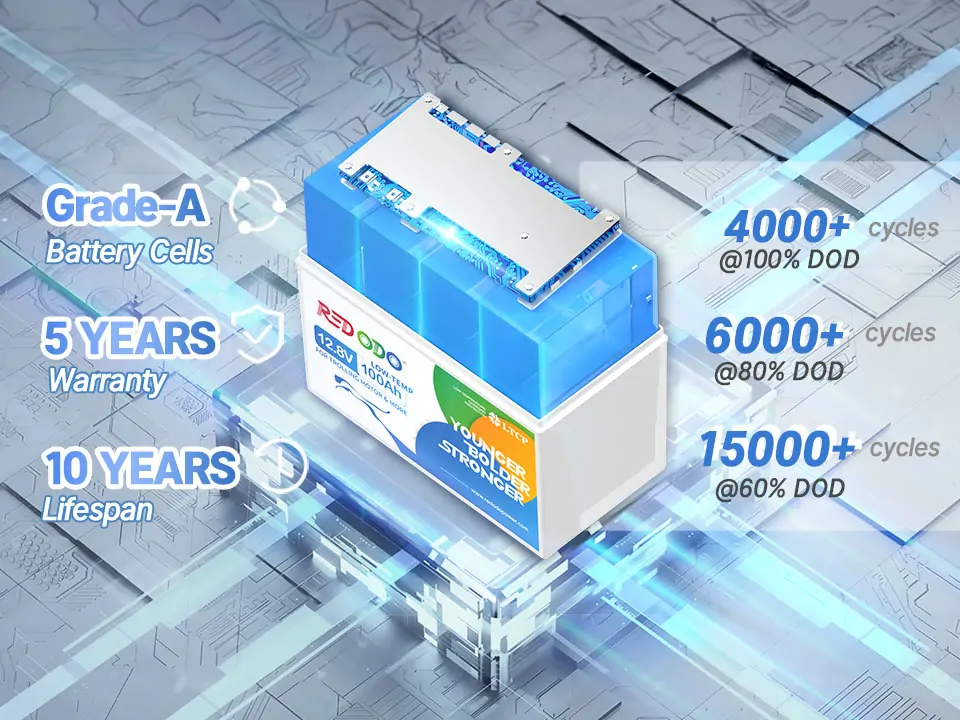
For the best performance and durability, lithium marine batteries are recommended, especially for demanding applications like trolling motors and solar systems.
6 Best Lithium Marine Batteries at Redodo
Choosing the best marine battery is essential for ensuring your boat operates smoothly, whether you're powering the engine, trolling motor, or onboard electronics. Redodo offers a range of lithium marine batteries designed for various marine applications. Below is a detailed breakdown of the 6 best marine batteries from Redodo, with their pros and cons.
Best Marine Battery for Trolling Motor: 12V 100Ah Trolling Motor Battery
The Redodo 12V 100Ah Trolling Motor Battery is designed for trolling motors of different sizes boats, delivering consistent power without requiring frequent recharging. It’s ideal for boaters who need reliable performance over long trips.
Pros:
- Long lifespan: Provides up to 4000+ cycles, significantly outlasting traditional lead-acid batteries.
- Lightweight: Weighs 2/3 less than a comparable lead-acid battery.
- Fast charging: Charges faster than lead-acid batteries, reducing downtime.
- Maintenance-free: No need for periodic maintenance like water topping or venting.
- Upgraded BMS for safety features: The upgraded BMS adds additional pre-charge functions, automatic recovery after protection, enhanced moisture-proof, and salt-spray anti-levels for harsh marine environments.
Cons:
- Single purpose: Not suitable for use as a starter battery or for high-power applications.
- Requires a lithium-compatible charger: You need a specialized LiFePO4 charger to maximize its lifespan.
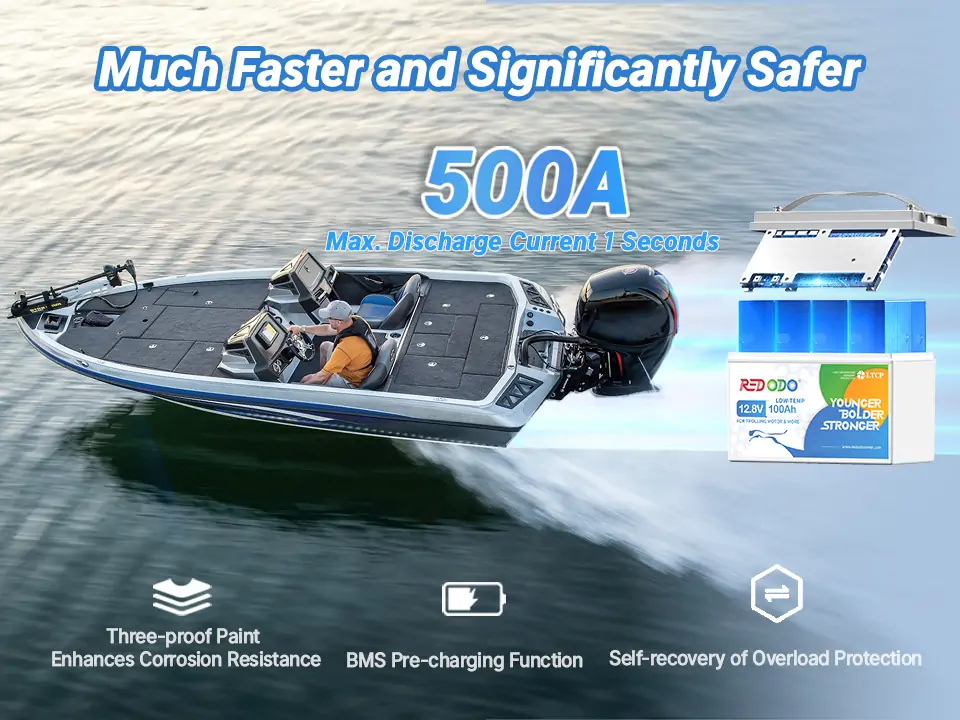
Best Marine Battery for Cranking: 12V 20Ah Marine Cranking Battery
Designed for quick engine starts, the 12V 20Ah Marine Cranking Battery uses luxury car-grade prismatic cells, ensuring durability and high discharge rates to crank up your boat engine without a hitch.
Pros:
- 650CCA High Cranking Power: Delivers 650CCA and 810MCA, perfectly compatible with fuel-powered outboard motors up to 135hp.
- Industry-leading structural design: High-strength metal fixation is used to restrict thermal expansion of the battery cells and extend battery life.
- Durable design: Can withstand extreme marine conditions, including salt spray, vibration, and shock.
- 50% lighter than lead-acid batteries: Easier to install and reduces overall boat weight.
- High safety standards: Equipped with low-temp charging cutoff protection to prevent charging below 0°C.
- Super-Fast Charging: Fully charged in 40 minutes with a 30A current and supports up to 80A from an outboard motor’s alternator.
Cons:
- Limited capacity for deep-cycle use: Not ideal for powering electronics or trolling motors for extended periods.
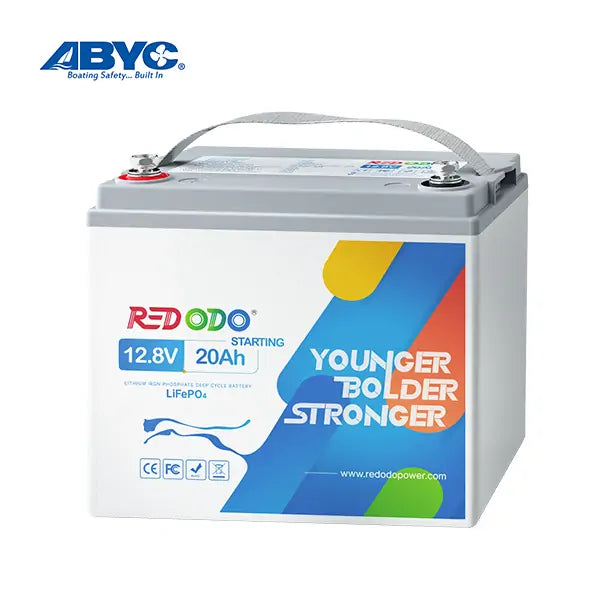
Best Marine Battery for Starting and Electronics: 12V 140Ah Dual Purpose Marine Battery
The Dual Purpose Marine Battery provides a reliable power source for both engine starting and running onboard electronics. Its high capacity and dual-purpose design make it ideal for boats with moderate to heavy electrical demands, ensuring smooth engine cranking while powering electronics like fish finders, GPS, and lights.
Pros:
- 900CCA High Cranking Power: Delivers 900 CCA and 1200 MCA, capable of cranking outboard motors up to 225hp.
- Dual-purpose design: Combines the functionality of a cranking battery and a deep-cycle battery, making it versatile for marine applications.
- Automatic Heating Function: Activates when cell temperature drops below 41°F (5°C) and stops once it reaches 50°F (10°C), ensuring performance in cold conditions.
- Bluetooth Monitoring & Control: Monitor battery stage with advanced Bluetooth 5.0. Manage discharge and power-off with ease.
- IP67 Rated: Waterproof, dustproof, and salt spray-proof, built to withstand harsh marine environments.
Cons:
- Higher cost: The price may be prohibitive for those who have a tight budget or with limited power needs.
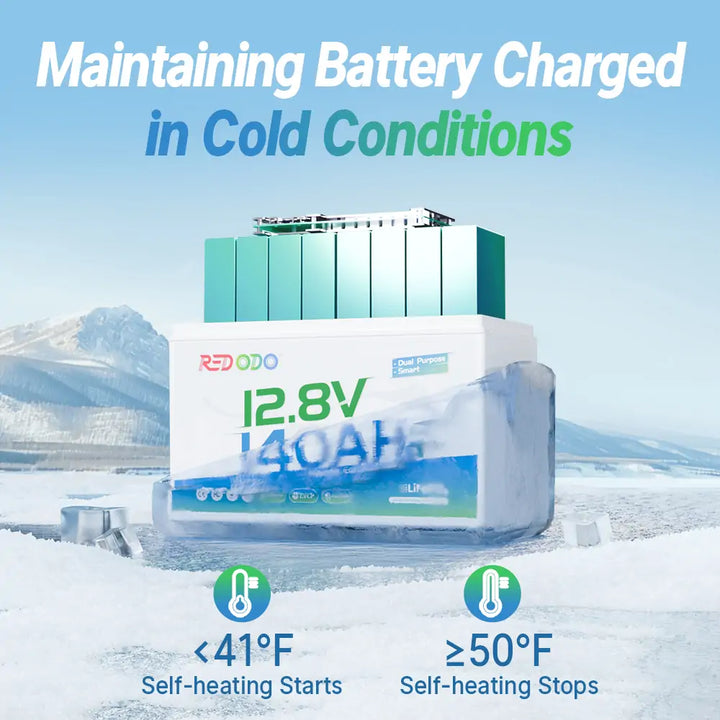
Best Marine Battery for Long Trips: 12V 300Ah Deep Cycle Battery
This high-capacity 300Ah battery is designed for boats that require substantial energy to run high-power electronics, trolling motors, or for long trips on the water. Its large capacity makes it perfect for extended boating adventures.
Pros:
- High capacity: Offers 300Ah to power larger boats or boats with numerous accessories.
- Perfect for Solar System: Ideal for boats equipped with solar panels with its large capacity.
- Fast charging: Even with its large capacity, the battery charges relatively quickly in just 5 hours, minimizing downtime between uses.
- Long lifespan: Delivers over 4000 cycles, significantly reducing the need for replacements.
- Low maintenance: Requires no maintenance compared to lead-acid batteries.
Cons:
- Higher cost: The price may be prohibitive comparing with other deep cycle marine battery.

Best Marine Battery for Kayaks: 12V 50Ah Mini Lithium Battery
This mini battery is tailored for kayaks and small watercraft, where space and weight are critical factors. It offers compact power without sacrificing performance.
Pros:
- Cost-effective: Lower price point while still offering the benefits of a lithium-ion battery.
- Best Compact and lightweight: At just 11.27 lbs, it’s easy to carry and perfect for kayaks or small boats where space is limited.
- Bluetooth 5.0: Keep tabs on your battery's remaining capacity, cycle count, voltage, current, and more with the Redodo App.
- Low-temperature cut-off protection: Stop charging below 0°C to protect the battery and extend its life.
- Long lifespan: Offers up to 4000 cycles, ensuring durability and longevity.
Cons:
- Limited power: Its small size means it won’t handle large power loads.
- Not ideal for bigger boats: This battery is best suited for small vessels like kayaks and canoes.
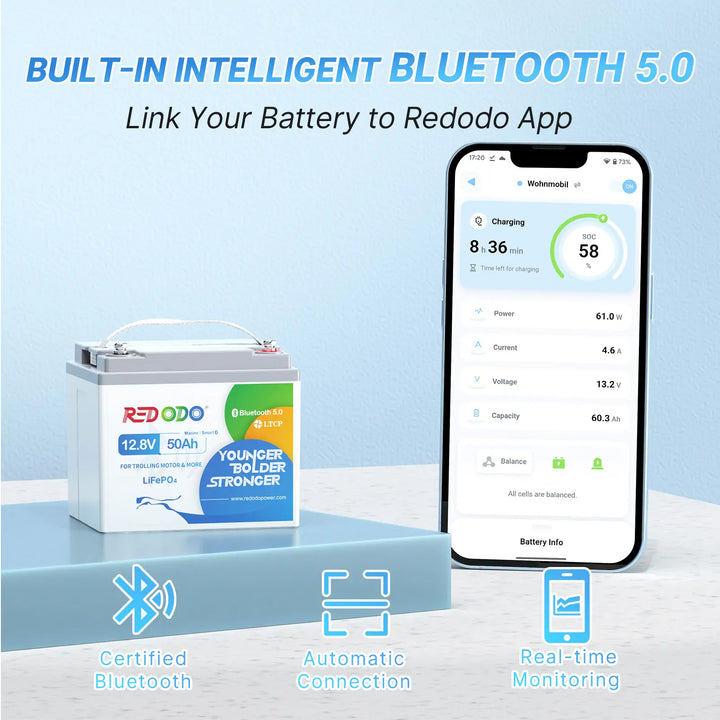
Best Marine Battery for Multiple Features: Redodo Group 31 Bluetooth Lithium Battery
This high-performance battery combines advanced features like Bluetooth monitoring, making it easy to check battery status and manage discharge & power-off via a mobile app.
Pros:
- Bluetooth monitoring: Allows you to check battery status, voltage, cycle count, and more via your smartphone, adding convenience.
- Low-temperature cut-off protection: Stop charging below 0°C to protect the battery and extend its life.
- Advanced protection: Features low-temp protection and an upgraded Battery Management System (BMS) with enhanced resistance to moisture, dust, and salt spray.
- Auto overload recovery: Automatically resets after an overload, reducing manual intervention.
Cons:
- Not suitable for starting: Specifically use for trolling motors and RV electronics.
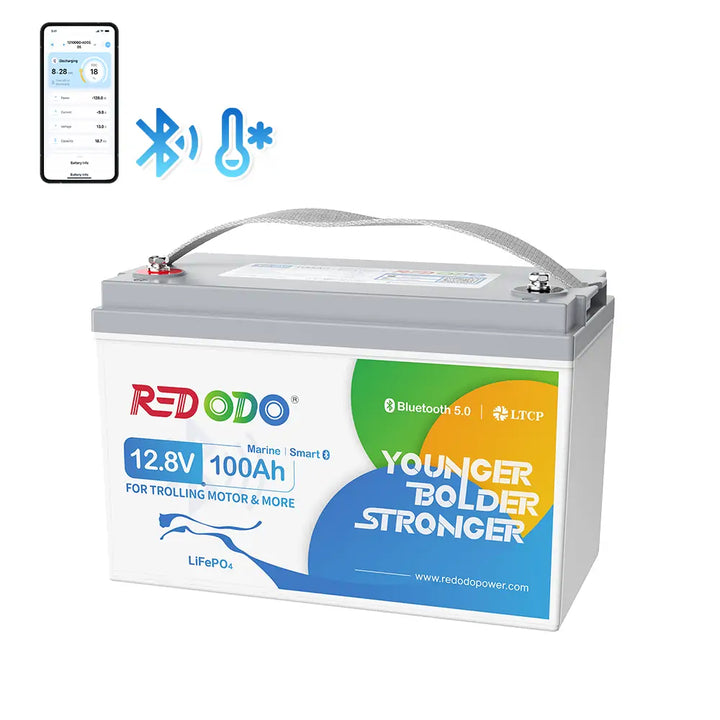
FAQs on Marine Batteries
1. Is there a difference between marine battery and regular battery?
Yes. Marine batteries are specifically designed to withstand the vibration, moisture, and temperature fluctuations encountered in marine environments. They are also built for deep cycling, starting, or dual purposes, unlike regular car batteries.
Read More: Marine Battery vs. Car Battery
2. How long do marine boat batteries last?
Traditional AGM Marine batteries typically last between 3 to 5 years. Regular maintenance, such as checking the water levels, cleaning the terminals, and ensuring proper charging, can help extend the lifespan of the battery. Lithium marine batteries can last up to 5-10 years and they are maintenance-free. While lithium marine batteries have a higher upfront cost compared to lead-acid batteries, their long-term value far outweighs the initial investment.
Read More: How Long Do Marine Batteries Last & Tips To Maintain
3. Do I need more than one marine battery on my boat?
You may need more than one battery if your boat has high power demands or is larger in size. For larger boats, it’s common to use separate batteries for different functions: a starting battery dedicated to cranking the engine and a deep-cycle battery for powering accessories like electronics, lights, and trolling motors.
4. Can I use marine batteries for RVs?
Yes, marine batteries, especially deep-cycle lithium batteries, can be used for RVs. However, not all marine batteries are created equal, and you should choose a 12V deep cycle marine battery specifically designed for RV use. For example, Redodo 12V 100Ah Deep Cycle Marine Battery is designed to provide a steady amount of power over an extended period of time, which is ideal for running marine trolling motor and RV appliances. Additionally, it's important to consider the size and capacity of the marine battery to ensure it meets the power requirements of your RV.
![[Complete Guide] 6 Best Marine Battery for Your Boats](http://www.redodopower.com/cdn/shop/files/Reodod_logo1.jpg?crop=center&format=webp&height=24&v=1730185167&width=24)
Redodo
![[Complete Guide] 6 Best Marine Battery for Your Boats](http://www.redodopower.com/cdn/shop/files/Reodod_logo1.jpg?crop=center&format=webp&height=24&v=1730185167&width=24)
Redodo
Recent Post

How Long Does a Trolling Motor Battery Last?

Convert RV from Lead-Acid to Lithium Battery: A Complete Guide

How Long Will a 200Ah Battery Run an Air Conditioner?

A Full Review of Redodo 12V 140Ah Group 31 Deep Cycle Battery

![⚡[$220 after Sign-Up] Redodo 12V 100Ah Lithium Trolling Motor Battery With Low Temp Protection](http://www.redodopower.com/cdn/shop/files/Redodo12V100Ahlow-tempbattery.webp?v=1738462317)


![⚡[$220 after Sign-Up] Redodo 12V 100Ah Group 31 Bluetooth Lithium Battery | Real-Time Battery Monitoring | For RV, Marine, Solar](http://www.redodopower.com/cdn/shop/files/redodo_12v_100ah_bluetooth.webp?v=1744698930)
![⚡[$248 after Sign-Up] Redodo 12V 100Ah Plus Bluetooth Marine Battery | For Marine, Trolling Motors, RV](http://www.redodopower.com/cdn/shop/files/Redodo12V100AhOBMOutboardMotorLithiumMarineBattery.webp?v=1743584091)
![⚡[$220 after Sign-Up] Redodo 12V 100Ah Mini Lithium LiFePO4 Battery | Smallest Battery | For RV, Trolling Motor, Solar](http://www.redodopower.com/cdn/shop/files/Redodo12V100AhMiniLiFePO4LithiumBattery.jpg?v=1739959054)

![⚡[$239 after Sign-Up] Redodo 12V 100Ah Group 24 Bluetooth LiFePO4 Battery | Real-Time Battery Monitoring | For RV, Marine, Solar](http://www.redodopower.com/cdn/shop/files/Redodo_12V_100Ah_group_24_bluetooth_lithium_battery.jpg?v=1744253032)

![⚡[$266 after Sign-Up] Redodo 24V 50Ah Bluetooth Trolling Motor Battery | For 24V Trolling Motors with up to 100 lbs](http://www.redodopower.com/cdn/shop/files/Redodo24V50AhTrollingMotorBatterywithBluetooth02.webp?v=1741251660)
